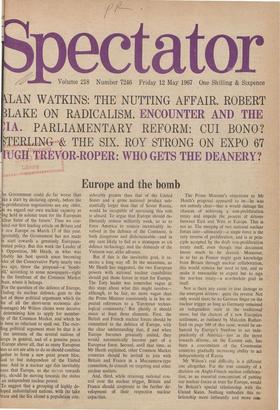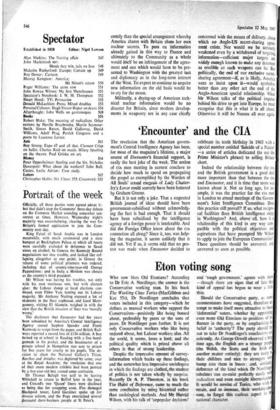Europe and the bomb
to Government could do far worse than ke a start by declaring openly, before the n-proliferation negotiations are any older, ► t we regard our own nuclear capacity as ing held in solemn trust for the European clear force of the future.' Thus we con- ded our first leading article on Britain and new Europe on March 17 of this year. grettably, the Government has not made s start towards a genuinely European- elated policy. But this week the Leader of Opposition, Mr Heath, in what was bably his best speebh since becoming der of the Conservative Party nearly two rs ago, threw the proposal—a 'bomb- ell,' according to some newspapers—right o the forefront of the Common Market bate, where it belongs.
For the question of the defence of Europe, luding its nuclear defence, goes to the rt of those political arguments which (in to of all the short-term economic dis- vantages) Mr WilSon claims were decisive determining him to apply for member- ip of the Common Market, and which he s been so reluctant to spell out. The over- ing political argument must be that it is the interests of the several nations of rope in general, and of a genuine peace Europe above all, that as many European tes as are are able to do so should combine ether to form a new great power bloc, ied to but independent of the United tes. And in a nuclear age this inevitably ans that Europe, as she moves towards ty, should be moving towards the status an independent nuclear power. siderably greater than that of the United States and a gross national product sub- stantially larger than that of Soviet Russia, would be incapable of sustaining this role is absurd. To argue that Europe should de- liberately remain militarily weak, so as to force America to remain inextricably in- volved in 'the defence of the Continent, is both dangerous and dishonourable—and in any case likely to fail as a stratagem as us defence technology, and the demands of the Vietnam war, alike advance.
But if this is the inevitable goal, it re- mains a long way off. In the meantime, as Mr Heath has suggested, the two European powers with national nuclear capabilities should put those forces in trust for Europe. The Tory leader was somewhat vague at this stage about what this might involve— although, to be fair, no more vague than the Prime Minister consistently is in his re- peated references to a 'European techno- logical community.' But plainly it should mean at least three elements. First, the British and French nuclear forces should be committed to the defence of Europe, with the clear understanding that, if and when Europe becomes genuinely united, they would automatically become part of a European force. Second, until that time, as Mr Heath explained, other Common Market countries should be invited to join with Britain and France in a Macnamara-type committee, to consult on targeting and other nuclear matters. The Prime Minister's objections to Mr Heath's proposal appeared to be—he was not entirely clear—that it would damage the chances of achieving a non-proliferation treaty and impede the process of détente between East and West in Europe. This is not so. The merging of two national nuclear forces into—ultimately----a single force is the very reverse. of proliferation, and is in prin- ciple accepted by the draft non-proliferation treaty itself, even though that document leaves much to be desired. Moreover, in so far as France might gain knowledge from Britain through nuclear collaboration, this would remove her need to test, and so make it reasonable to expect her to sign the test-ban treaty—a worthwhile goal in itself.
Nor is there any cause to fear damage to the emergent detente: quite the reverse. Not only would there be no German finger on the nuclear trigger so long as Germany remained an independent state in the traditional sense, but the chances of a new European settlement, as outlined by Malcolm Ruther- ford on page 549 of this issue, would be en- hanced by Europe's freedom to act inde- pendently of America—just as the .move towards détente, on the Eastern side, has been a concomitant of the Communist countries gradually increasing ability to act independently of Russia.
Mr Wilson's real difficulty is a different one altogether. For the true casualty of a decision on Anglo-French nuclear collabora- tion, as an essential concomitant of putting our nuclear forces in trust for Europe, would be Britain's special relationship with the United States. Nothing embodies this re- lationship more intimately and more con- cretely than the special arrangement whereby America shares with Britain alone her own nuclear secrets. To pass on information already gained in this way to France and ultimately to the Community as a whole would itself be an infringement of the agree- ment and one which would have to be pre- sented to Washington with the greatest tact and diplomacy as in the long-term interest of the West. To expect to continue to acquire new information on the old basis would be to cry for the moon.
Militarily, a drying-up of American tech- nical nuclear information would be no disaster for Britain, since modern develop- ments in weaponry are in any case chiefly concerned with the means of delivery, about which no Anglo-US secret-sharing agree. meat exists. Nor would we be seriously weakened even by a withdrawal of targeting information—sufficient major targets ate widely enough known to make any deterrent as credible as such weapons can be. But politically, the end of our exclusive secret. sharing agreement—if, as is likely, America were to insist upon it—would symbolise better than any other act the end of the Anglo-American special relationship. When Mr Wilson talks of the political impetus behind his drive to get into Europe, he must recognise that this is what it is all about Otherwise it will be Nassau all over again.































